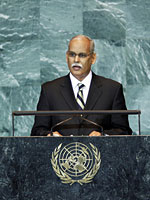Mauritania
H. E. Mr. Abderrahim Ould Hadrami, Chairperson of the Delegation
29 September 2008
- Video: Arabic | English [RealPlayer - 16 min]
- Statement: Arabic | English [PDF]
- Back to the list of speakers
Statement Summary

© UN Photo
Click for caption and to enlarge
ABDERRAHIM OULD HADRAMI (Mauritania) said that, after two decades of political tyranny and corruption, his country’s Armed Forces had intervened in April to establish a transitional democratic State. Mauritania had then proceeded to engage in a transparency initiative among the extracting industries. Property belonging to public officials was subject to disclosure of property, and there was increased transparency in public transactions. A new law had been established to strengthen press freedom. A quota of 20 per cent had been set for women candidates seeking Government positions, which had led to 18 women being elected to the current Parliament.
The military intervention had been undertaken because the former President had proven unable to lead the country, he said. He had used public finances to buy the allegiance of some parliamentarians and fired public officials in an arbitrary manner. He had threatened to dissolve Parliament to avoid the formation of a parliamentary committee to investigate the sources of financing of a private business created by his family. While the country’s economy had become poorer, the former President had gone on overseas trips at the expense of the taxpayers. As a result of the change in Government, the Higher Council of State had declared its commitment to protect democracy and organize free and transparent elections at the earliest possible date.
On other fronts, Mauritania was committed in its support for various multinational organizations, such as the Union of the Arab Maghreb, the League of Arab States, the African Union and the United Nations, he said, paying tribute to the General Assembly for its efforts to reform the world body, particularly the Security Council. In that regard, Mauritania called for the African and Arab groups to be represented in the Council’s membership. Japan and Germany should also have permanent seats, since they both played a vital role in the maintenance of international peace and security.
He went on to praise the Assembly’s efforts to deal with the effects of rising food prices at its last session, in financing development projects and tackling the problems of climate change. The Assembly’s sixty-third session had come at a very difficult time, with food prices reaching crisis levels and threatening to undermine the economies of developing countries. Mauritania called on wealthy countries to honour their financial promises to poorer countries.
Turning to peace and security issues, he voiced support for the restoration of the right to self-determination of the Palestinian people and the establishment of their own State. Mauritania disagreed with the request by the Prosecutor of the International Criminal Court for the arrest of the President of the Sudan, which would create more tension. However, ongoing negotiations on Western Sahara deserved praise. Mauritania condemned terrorism in all forms and supported tolerant Islamic values.
On the subject of development, he expressed concern over the deadlock in the Doha Development Round, and called upon industrialized countries to show more flexibility and stronger political will to push negotiations forward. On other issues, the consequences of development, such as climate change, boded ill for Mauritania, especially if it caused a rise in sea levels. Industrial countries must limit the emissions that caused greenhouse gases.
[Source: GA/10758]